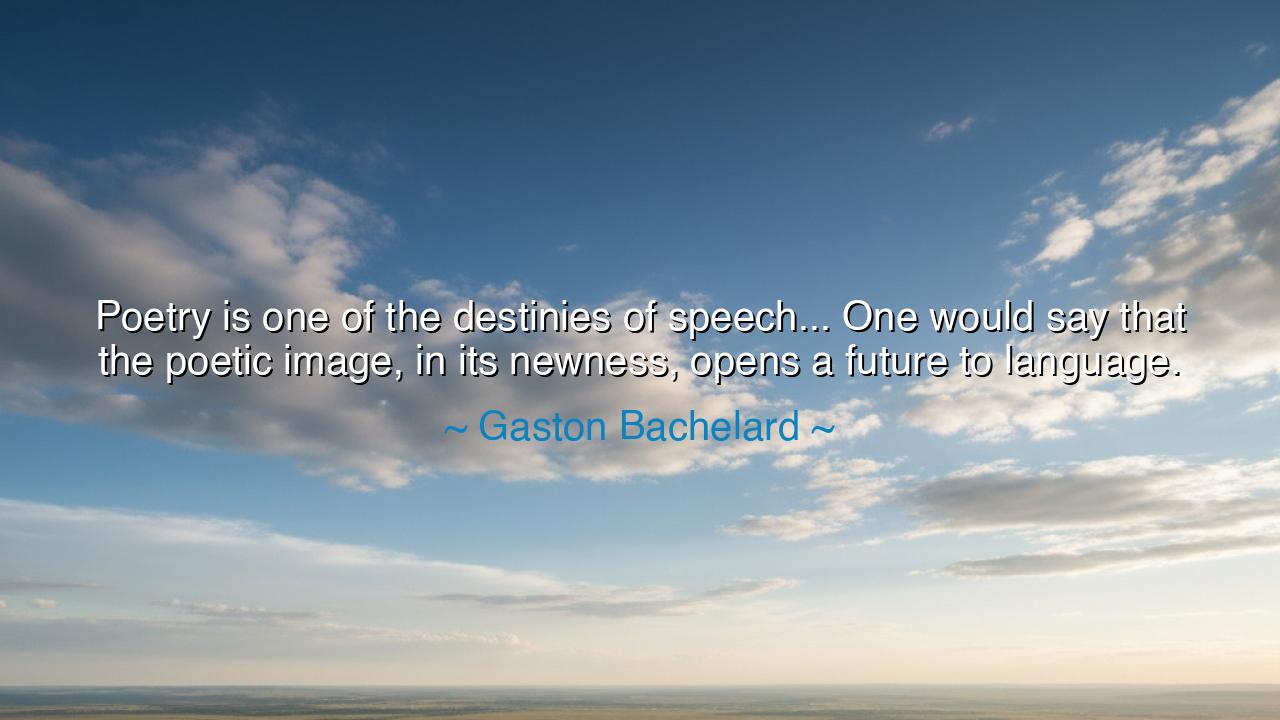
Poetry is one of the destinies of speech... One would say that
Poetry is one of the destinies of speech... One would say that the poetic image, in its newness, opens a future to language.






“Poetry is one of the destinies of speech… One would say that the poetic image, in its newness, opens a future to language.” Thus spoke Gaston Bachelard, philosopher of reverie, whose meditations on imagination lifted words into the realm of vision. In this teaching, he shows us that poetry is not merely ornament, nor pastime, but a fulfillment of language’s deepest calling. For speech was not born only to command or to describe, but to soar—to create new realities, to unveil unseen worlds.
The meaning of this saying lies in the power of the poetic image. Ordinary speech looks backward: it names what is already known, it points to what is already seen. But the poetic image bursts forward: it invents, it surprises, it opens a future. When a poet says the sky is “a torn cloak of fire,” he does not merely describe—he reshapes the way we see the sky forever. Thus, in Bachelard’s words, poetry becomes the destiny of speech itself: to go beyond mere communication, and to become creation.
The origin of this insight is found in Bachelard’s lifelong study of imagination. He believed that images were not passive reflections but living forces, capable of transforming thought and perception. For him, the poetic image was not bound by logic or tradition; it was sudden, fresh, and liberating. Each new image was like a star opening in the night, giving language a horizon it had not yet known. Poetry, therefore, was not a branch of literature only—it was a vital future of human expression.
Consider the story of Dante Alighieri, who in his Divine Comedy gave us images that continue to shape our moral imagination. His vision of Hell’s circles, of the mountain of Purgatory, of the celestial rose—these were not mere descriptions but new realities spoken into being. For centuries, humanity has spoken in Dante’s terms, imagining the afterlife with the images he birthed. Dante fulfilled what Bachelard proclaimed: through the poetic image, he opened a future for language, and in doing so, shaped the future of thought.
The lesson is clear: do not underestimate the power of words to shape worlds. Every time we speak poetically, we are not only expressing ourselves—we are altering the destiny of language itself. Our metaphors, our visions, our songs plant seeds in the soil of the future. The task of the poet, then, is sacred: to craft images that enlarge the horizon of humanity, that give speech its noblest destiny.
Practically, this means we must cultivate imagination in our speaking and writing. Do not be content with clichés or worn-out phrases, for these close the future instead of opening it. Search for freshness, for images that awaken and surprise. Read the poets who dared to give language new futures—Blake, Neruda, Dickinson, Tagore—and let their daring ignite your own. In daily life, speak in ways that give others vision, not just information.
Thus the teaching endures: poetry is not the echo of speech but its destiny, not the shadow of language but its light. The poetic image, in its newness, does not simply record the world—it remakes it. And every time we speak with vision, we open a future where words can carry us further than we have ever gone. Let us therefore speak not only to name, but to create; not only to describe, but to dance with the infinite. For in poetry, the destiny of speech is fulfilled, and the future of language begins.






AAdministratorAdministrator
Welcome, honored guests. Please leave a comment, we will respond soon